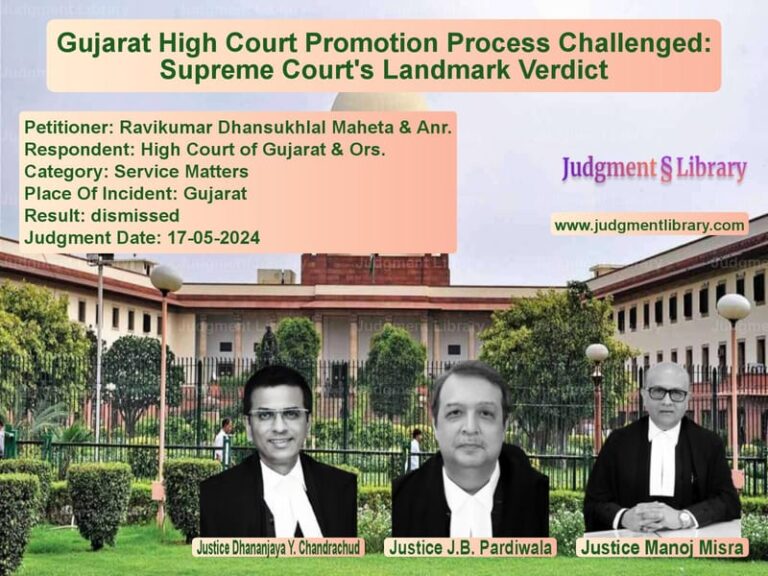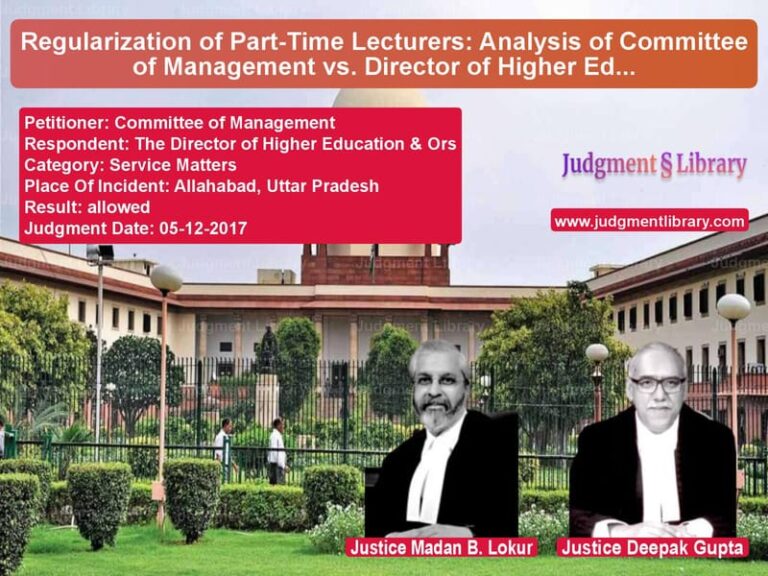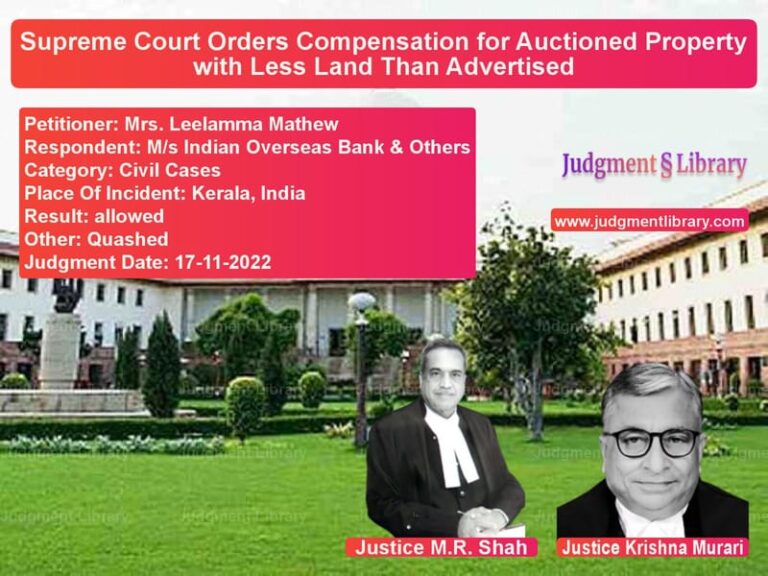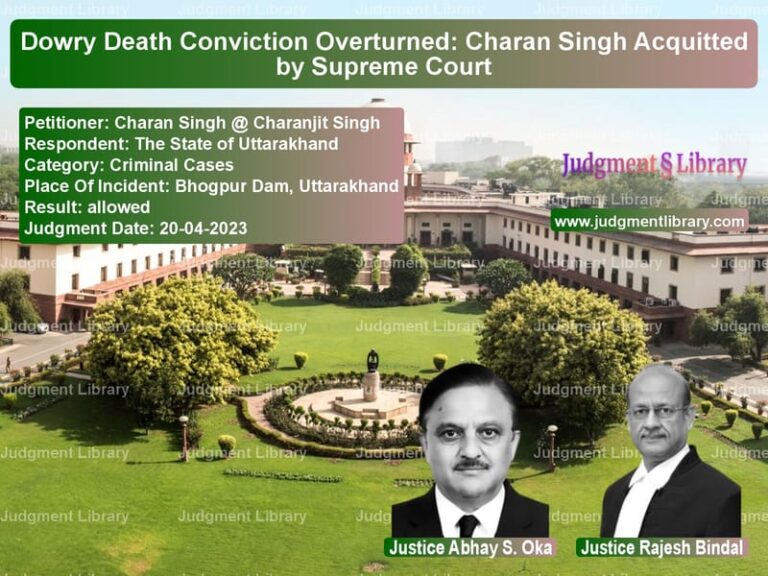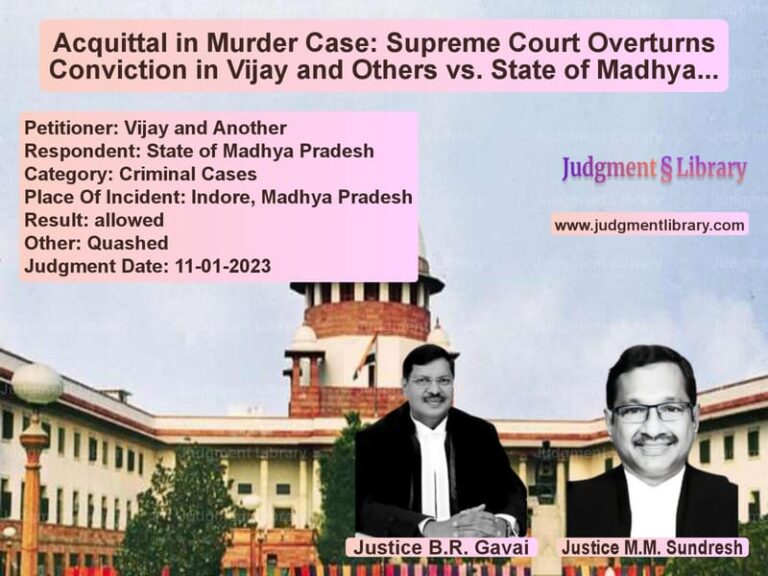Land Dispute and Specific Performance: Supreme Court Ruling Explained
The Supreme Court of India recently decided a complex legal dispute involving the specific performance of agreements for the sale of land measuring 7.86 acres in Survey No. 59/2, Kundavari Khandrika Village, Vijayawada. The appeals were filed by Lakshmi Sreenivasa Cooperative Building Society against the legal heirs of Puvvada Rama and others. The key legal questions revolved around the validity of agreements, payment of earnest money, and compliance with statutory requirements. The case involved two separate agreements—one dated June 30, 1977, and another dated October 16, 1981.
The matter reached the Supreme Court after both the trial court and the High Court of Andhra Pradesh ruled against the appellant Society. The courts found that the agreements were not sufficiently proved and that the necessary legal and procedural requirements had not been met to grant specific performance. The Supreme Court upheld these findings, leading to the dismissal of the appeals.
Background of the Case
The dispute originated when multiple parties laid claim to the same parcel of land based on different agreements of sale. The appellant Society had entered into an agreement dated October 16, 1981, allegedly in continuation of an earlier agreement dated June 30, 1977. Meanwhile, another party, Allu Appalanarayana, had an agreement dated November 22, 1979, in his favor.
The trial court found that the appellant Society had failed to prove the execution of the agreements and the payment of earnest money. The High Court upheld this ruling, and the matter was brought before the Supreme Court.
Issues Considered by the Supreme Court
- Whether the agreements relied upon by the appellant Society were legally valid and enforceable.
- Whether the Society had proven payment of earnest money and possession of the land.
- Whether there were statutory prohibitions under the Urban Land Ceiling Act that made the agreements unenforceable.
- Whether defendant No.1 was of unsound mind and incapable of executing agreements.
Arguments by the Appellant
The appellant Society argued that both the trial court and the High Court erred in their appreciation of evidence. It contended that the agreements were legally executed and enforceable, and that it had made substantial investments based on them. The Society claimed that it had taken possession of the land and performed its obligations under the agreements.
The appellant further contended that the courts had overlooked the documentary evidence showing the steps it had taken to convert the land use and secure necessary approvals. It also challenged the finding that defendant No.1 was of unsound mind, arguing that an adverse inference should have been drawn against the respondents for not examining him as a witness.
Arguments by the Respondents
The respondents, on the other hand, argued that the concurrent findings of fact by the trial court and the High Court should not be interfered with. They emphasized that the agreements were unregistered and lacked sufficient proof of execution. The respondents pointed out that no attestors or scribe of the agreements were examined, and no documentary proof was provided for the payment of earnest money.
They also highlighted that the agreements were executed despite the statutory prohibition under the Urban Land Ceiling Act, rendering them legally unenforceable. Additionally, they argued that the claim of possession by the appellant Society was not supported by any independent evidence, such as revenue records or tax receipts.
Supreme Court’s Analysis
The Supreme Court noted that the appellant Society had failed to prove the execution of the agreements. It observed that neither the attestors nor the scribe of the agreements were examined, which raised serious doubts about their validity. The Court also found that the agreements were unregistered, which further weakened the appellant’s claim.
Regarding the payment of earnest money, the Court noted that there was no documentary proof to support the claim. The appellant had not produced any receipts, bank statements, or other evidence to establish that any payments had been made. The Court also took note of the fact that the agreements lacked any endorsements confirming the transfer of possession.
On the issue of the Urban Land Ceiling Act, the Court held that the agreements were executed in violation of statutory provisions. The Court ruled that agreements executed in contravention of statutory law cannot be enforced, regardless of the parties’ intentions.
Key Observations by the Supreme Court
The Supreme Court made several important observations in its judgment:
- “Neither the attestors nor the scribe of the agreements were examined, which casts serious doubt on their authenticity.”
- “There is no documentary proof of payment of earnest money, which is a crucial requirement for enforcing specific performance.”
- “The agreements were unregistered, which significantly weakens the appellant’s claim.”
- “The Urban Land Ceiling Act prohibits transactions of this nature, rendering the agreements legally unenforceable.”
- “Possession was not proved through independent evidence, such as revenue records or tax receipts.”
Final Verdict
After considering all the arguments and evidence, the Supreme Court dismissed both appeals. The Court held that the appellant Society had failed to establish its claims and that the concurrent findings of the trial court and the High Court did not warrant interference.
The Court also rejected the appellant’s request for a refund of earnest money, noting that there was no proof that any payment had been made. It reiterated that courts cannot grant relief based on mere assertions without supporting evidence.
Conclusion
The Supreme Court’s judgment underscores the importance of proper documentation and adherence to statutory requirements in land transactions. It serves as a reminder that specific performance cannot be granted unless all legal and evidentiary requirements are met.
For buyers and real estate investors, the case highlights the need to ensure that agreements are properly executed, registered, and supported by documentary proof of payments. It also emphasizes the necessity of complying with statutory regulations, such as the Urban Land Ceiling Act, to avoid legal complications.
Ultimately, this case reaffirms the principle that courts will not enforce contracts that are legally defective or unsupported by sufficient evidence. The Supreme Court’s decision upholds the integrity of property transactions and ensures that legal safeguards are not bypassed.
Petitioner Name: Lakshmi Sreenivasa Cooperative Building Society.Respondent Name: Puvvada Rama (Dead) by L.Rs. and Others.Judgment By: Justice Dipak Misra, Justice A.M. Khanwilkar, Justice D.Y. Chandrachud.Place Of Incident: Vijayawada.Judgment Date: 31-07-2018.
Don’t miss out on the full details! Download the complete judgment in PDF format below and gain valuable insights instantly!
Download Judgment: Lakshmi Sreenivasa C vs Puvvada Rama (Dead) Supreme Court of India Judgment Dated 31-07-2018.pdf
Direct Downlaod Judgment: Direct downlaod this Judgment
See all petitions in Property Disputes
See all petitions in Contract Disputes
See all petitions in Specific Performance
See all petitions in Judgment by Dipak Misra
See all petitions in Judgment by A M Khanwilkar
See all petitions in Judgment by Dhananjaya Y Chandrachud
See all petitions in dismissed
See all petitions in supreme court of India judgments July 2018
See all petitions in 2018 judgments
See all posts in Civil Cases Category
See all allowed petitions in Civil Cases Category
See all Dismissed petitions in Civil Cases Category
See all partially allowed petitions in Civil Cases Category


